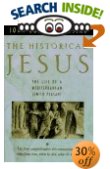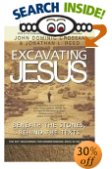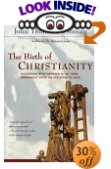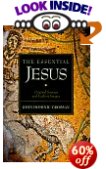

Jesus: A Revolutionary Biography. by John Dominic Crossan
Based on Crossan's more scholarly text, The Historical Jesus (1992) see next panelthis biographical study makes the author's view of Jesus as a social revolutionary available to a wider audience. Crossan clearly defines the problem of trying to locate the historical Jesus in the midst of myth, and he tells readers how he intends to find that Jesus: through cross-cultural anthropology, Greco-Roman and Jewish history, and literary and textual evidence.

The Historical Jesus : The Life of a Mediterranean Jewish Peasant
by John Dominic Crossan
"Crossan sees Jesus as a radical social reformer, an egalitarian peasant leader who challenged the religious and political powers of his day by preaching that everyone has immediate access to the divine through their everyday life."

Excavating Jesus : Beneath the Stones, Behind the Texts: Revised and Updated by John Dominic Crossan, Jonathan L. Reed
Follow the premier historical Jesus authority and a brilliant archaeologist as they search the texts and stones of antiquity for the real Jesus.
See reviews

The Birth of Christianity : Discovering What Happened in the Years Immediately After the Execution of Jesus by John Dominic Crossan
Crossan's conclusions don't come from newly discovered documents; they come from freshly-minted academic methodologies. He uses anthropology, history, and archaeology to construct his arguments about the essential nature of both Jesus' religion and Paul's. The 25-cent summary of his conclusion is that Jesus did not recognize the dualism between spirit and flesh that formed the basis of Paul's apocalyptic Christianity. In other words, Jesus was more Jewish than Paul. The ramifications of this argument are huge. Crossan says much of Christian worship--and many of the world's injustices--are based on the dualistic Christ that Paul preached.

The Essential Jesus: Original Sayings and Earliest Images
by John Crossan
John Dominic Crossan's collection provides readers with a fresh look at the central lessons of Christianity's great teacher in his depictions of the "historical Jesus ... in both his vision and program." His excellent introduction puts forth the radical thesis that Jesus is best understood as a social reformer, a poor Jew in an occupied country who stressed social equality as much as or more than individual salvation. Attempting to see Christ not through 20th-century eyes but in the social, political, and economic context in which he lived and taught, Crossan points out that for the first 300 years after his crucifixion what was emphasized was not Jesus' divinity but his concern for communal empowerment. The picture that emerges is of a political and social rebel, a fearless champion to the poor and dispossessed.